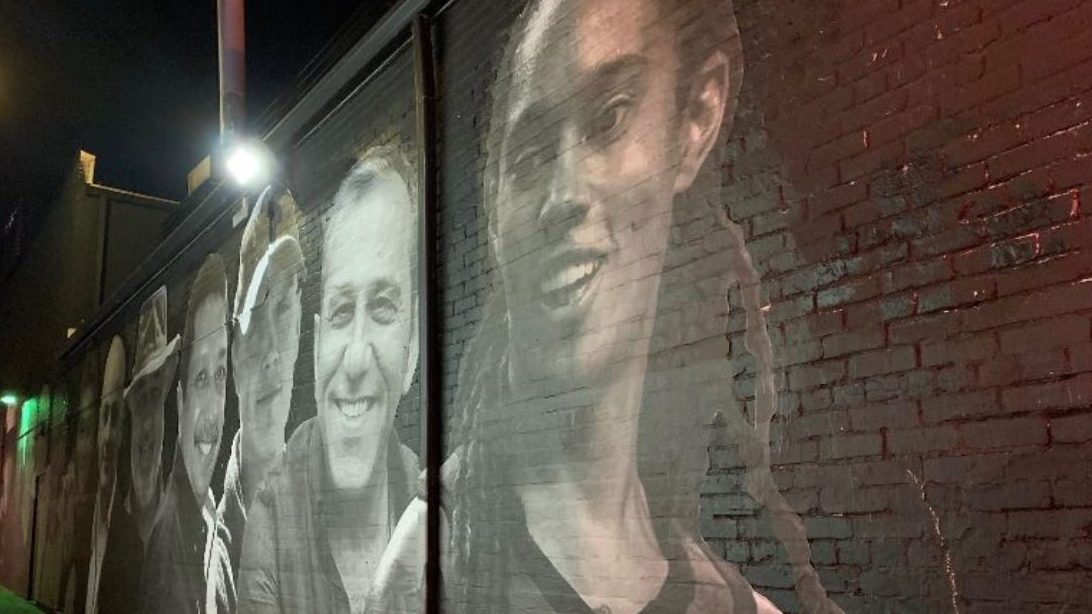Mural revealed to honor Brittney Griner, American detainees abroad
Jul 20, 2022, 9:19 AM
A mural in Washington DC to honor Americans who have been detained abroad was revealed on Wednesday morning. It featured Phoenix Mercury star Brittney Griner, who has been in a Russian prison since February.
A new mural in Washington DC featuring @TheWNBPA member @brittneygriner is being unveiled by #BringOurFamiliesHome. Can't be at 3125 M Street in DC 11:30 ET TODAY? Watch live ➡️ https://t.co/RWEMhoGHm4 #BringThemHome #WeAreBG (Artist: Isaac Campbell) pic.twitter.com/QhBPaI3gKW
— The Chris Mosier (@TheChrisMosier) July 20, 2022
A new mural in Washington DC featuring @TheWNBPA member, @brittneygriner, has been unveiled by the @BOFHcampaign ❤️ #WeAreBG pic.twitter.com/G9ZP327un7
— NWSLPA (@nwsl_players) July 20, 2022
Members of the New York Liberty now arriving. pic.twitter.com/QKfCQAj50q
— PJ Morales 🇨🇺🇵🇷 (@pjdaman12) July 20, 2022
The mural includes 18 detained Americans, according to the Foster’s Daily Democrat: Griner, Emad Shargi, Luke Denman, Alirio Zambrano, Morad Tahbaz, Mark Swidan, Jose Angel Pereira, Siamak Namazi, Baquer Namazi, Jose Luis Zambrano, Jorge Toledo, Matthew Heath, Majd Kamalmaz, Airan Berry, Paul Whelan, Shahab Dalili, Kai Li and Paul Rusesabagina.
Griner, a two-time Olympic gold medalist and standout for the Mercury, was arrested at Moscow’s Sheremetyevo Airport after customs officials said they found vape canisters containing cannabis oil in her luggage. She faces up to 10 years in prison if convicted on charges of transporting drugs.
In court last week, Griner pleaded guilty and acknowledged possessing the canisters but said she had no criminal intent and said they were in her luggage because she packed them hastily in her return to Russia to play for the UMMC Ekaterinburg basketball team during the WNBA’s offseason.
President Joe Biden signed an executive order Tuesday aimed at increasing the flow of information to families of Americans detained abroad and at imposing sanctions on the criminals, terrorists or government officials who hold them captive.
It is unclear if the new order will result in bringing home more Americans jailed in foreign countries, but senior Biden administration officials who previewed the action to reporters said they regard it as an important way to raise the cost of hostage-taking and to punish captors.
The executive order is being announced as the administration faces criticism from some families over a perceived lack of creativity and aggressiveness in getting their loved ones home. It also comes as the ongoing detention in Russia of Griner has brought increased attention to the population of Americans who are jailed abroad and designated by the U.S. as wrongfully detained.
The action relies on a section of the Robert Levinson Hostage Recovery and Hostage-Taking Accountability Act — named after a retired FBI agent who vanished in Iran 15 years ago and is now presumed dead — that authorizes the president to impose sanctions, including visa revocations, on people believed to be involved in the wrongful detention of Americans.
In this case, officials said, that could apply to government officials or to criminals or terrorists unaffiliated with a government. Since sanctions may not always help facilitate a jailed American’s release — Russia’s invasion of Ukraine, for instance, has proceeded despite a wave of economic sanctions from Western allies — such punishment is expected to be used judiciously, according to one official who briefed reporters on the condition of anonymity under ground rules set by the administration.
Another element of the order will direct federal agencies to do better at sharing information and intelligence with families of detainees about the latest status of their case and efforts to get their loved one home.
In addition, the State Department is adding a new risk indicator to its country-specific travel advisories to warn travelers about nations where there’s believed to be an elevated risk of detention.
The department already uses foreign travel risk indicators for categories including crime, health and kidnapping. Officials said the new risk indicator, marked as “D” for detention, will be applied at least initially to the following countries: Burma, China, Iran, North Korea, Russia and Venezuela.
Relatives of jailed Americans gathered in Washington, D.C., this week for the unveiling of a mural to honor the detainees. Administration officials would not say whether Biden would meet with the families.
The Associated Press contributed to this story.








